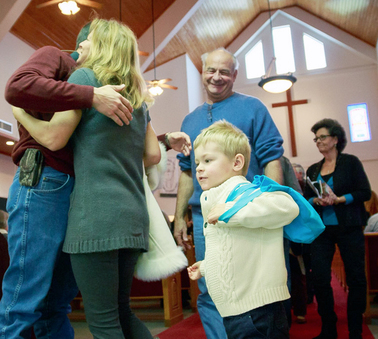 Church attendance nationally is down, and not just by a little bit. It is as though in the last fifteen years our culture has just collectively decided that going to church on Sunday is not a "thing" anymore. And what is true for our nation is certainly true for us here at St. Paul’s. In 2001 our average weekly attendance was 822. In 2015 the average was 463. But trends are not fate. While our societal trends are not really in our control except to the degree we participate in them, we can still focus on what we can influence, which starts with ourselves. Most of the drop in attendance here at St. Paul’s is not because people have quit church altogether but because they have stopped attending regularly. Many people who used to be here every week now come once or twice a month. People who used to come every other week now come a few times a year. We have stopped taking it for granted that our week ought to begin with first things first by attending church and starting thinking of it more like a commodity, something to do when we really feel a need for it or when it is convenient. What was formerly a "given" has turned into an option. The New Testament tells Christians not to stop meeting together. Apparently some of the earliest Christians had already begun skipping regular worship under the mistaken impression that “going to church” didn’t matter for them as long as they had faith. But that misses most of the point about attendance. The key word is “together,” which means that you not only benefit from the presence of other people as you sing, pray, and hear the Word, but your presence also benefits them. When you decide to skip church, you aren’t only deciding for yourself that you can do without Word and Sacrament ministry and the mutual consolation of the brethren for a week. You’re also unilaterally declaring that everyone else can do just fine without you there. And you are wrong. The indelible impression on young minds of seeing widows and newlyweds, trouble-makers and respectable folk, black and white, rich and poor, young and old all singing and praying together can never happen if most of those people don’t show up. When you stay home because your toddler is such a hassle, you aren’t only making your morning more manageable. You’re also declaring that the 90 year old who sometimes sits behind you shall not have your toddler to smile at and thereby have his faith in the future of God’s promises reinforced. When you as a twenty-something stay home from church because Sunday is the day you sleep in and you don’t feel like you get much out of church anyway because you already learned it all in Sunday school, you’re not only getting extra sleep for yourself. You’re also depriving some other twentysomething visitor, who never did learn it all in Sunday school, and who is nervous and uncomfortable in church, of the assurance your presence might have given that this strange place is a place for them, too. When you as a middle-aged man skip church, you’re not only (mistakenly) reasoning that you have more important places to be, but you are robbing some fatherless teenage boy whose mom made him go to church that morning of the example your presence in worship might have given. When you stay home because you’re too embarrassed to use the wheelchair, you are robbing your church family of the comfort of seeing that growing old gracefully is possible, and that should the day ever come from them to be a wheelchair, their church would welcome them as it welcomes you. No matter who you are or what your situation is, when it says in Hebrews not to stop meeting together, God isn’t just telling you that you will be blessed if you go to church. He is also telling you are a blessing to the others there whether you know it or not. Don’t selfishly rob everyone else of the blessing God wants to give them through your voice, your problems, your prayers, and your presence with them in worship.
0 Comments
|
AuthorRev. Peter Speckhard, Senior Pastor at St. Paul's Ev. Lutheran Church, Munster, Indiana Archives
February 2021
Topics
All
|


 RSS Feed
RSS Feed